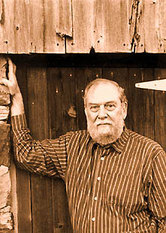
Edmund Keeley
Edmund Keeley, who lives in Princeton, N. J., is the author of seven novels, fifteen volumes of poetry and fiction in translation, and ten volumes of non-fiction.
His work in fiction, history, and criticism often makes use of the culture and landscape of Greece, where he lived for three years immediately before the Second World War and where, since 1949, he has normally spent his summers. His first novel, The Libation, tells the story of a young American who returns to Greece after the Second World War to reclaim the past he has lost after a decade away. In this he is helped by a companion of his childhood who eventually proves to be closely related to him, a certain parallel to the Orestes-Electra story in Aeschylus, hence the title. The novel received the Rome Prize of the American Academy of Arts and Letters. A second and third novel, The Gold-hatted Lover and The Impostor, both set in Greece, carried forward the theme of cultural conflict and resolution between the perspectives of American visitors and Greek residents. A fourth, Voyage to a Dark Island, tells the story of a failed expedition to recover sculptures off the island of Antikythira that had been left behind by sponge divers at the turn of the 19th century. Keeley’s latest novels, School for Pagan Lovers and Some Wine for Remembrance, are set in Salonika, the former a love story, the latter a requiem for the burning of Hortiati village in Northern Greece by the Wehrmacht in late 1944.
Keeley’s work in both fiction and non-fiction has sometimes taken the reader outside Greece. His most popular novel, A Wilderness Called Peace, is set in Southeast Asia and explores the tragic consequences of the Khmer Rouge takeover of Cambodia. A critical study, Cavafy’s Alexandria, maps the poet’s mythical rendering of that Egyptian city. And An Albanian Journal: The Road to Elbasan narrates the author’s 1995 trip to Albania with a group of American writers and publishers. But his best-known non-fiction examines aspects of recent Greek history. The Salonika Bay Murder is a study of the circumstanÂces surrounding the still unsolved murder of C.B.S. correspondent George Polk during the Greek Civil War, and Inventing Paradise: The Greek Journey, 1937–1947 focuses on a group of American, British, and Greek writers who created compelling images of Greece that have outlasted the turbulent decade of the title. This book received the 1999 Criticos Annual Prize of the London Hellenic Society. In 2005 Keeley published Borderlines: A Memoir, the story of his childhood in northern Greece and his subsequent education in America and England.
Keeley’s translations in collaboration with Philip Sherrard have included English editions of the poetry of major modern Greek poets, among these, C. P. Cavafy, Angelos Sikelianos, George Seferis, and Odysseus Elytis. His translations of Yannis Ritsos in several volumes have earned him the Harold Morton Landon Award of the Academy of American Poets, the First European Prize for the Translation of Poetry, and the PEN/Ralph Manheim Medal for Translation. In 1999 he was honoured by an Academy Award in Literature from The American Academy of Arts and Letters, and in 2001 the President of Greece named him a Commander of the Order of the Phoenix for his contribution to Greek culture. Also in 2001 he was elected a Corresponding Member of the Academy of Athens, and in 2002 Honorary Member of the Hellenic Authors’ Society. The Society awarded him the Dido Sotiriou Cultural Prize in 2008.
A graduate of Princeton and Oxford universities, Keeley taught English, Creative Writing, and Modern Greek literature at Princeton from 1954 to 1994 and served for some years as Director of the Creative Writing Program and as Director of the Program in Hellenic Studies. He is currently Charles Barnwell Straut Professor of English Emeritus. On several occasions he has been a resident fellow of the Rockefeller Center in Bellagio, Italy, a resident at the Virginia Center for the Creative Arts, and a Fulbright scholar resident in Greece. He served twice as President of the Modern Greek Studies Association, and during 1991-93 as President of PEN American Center, the association of writers. On eleven occasions he was American delegate at International PEN congresses, and he remains a member of PEN American Center’s Advisory Council. Since his retirement from teaching, he devotes most of his time to writing, but he also spends what time he can traveling to old and new places. He is currently at work, with other editors, on an anthology of Greek poetry in English translation, from Homer to the present, to be published by W.W. Norton.
Texts & References on this site
- Angelos Sikelianos: Selected Poems: Second Bilingual Edition (translator, with Philip Sherrard).
- A Greek Quintet (translator, with Philip Sherrard).